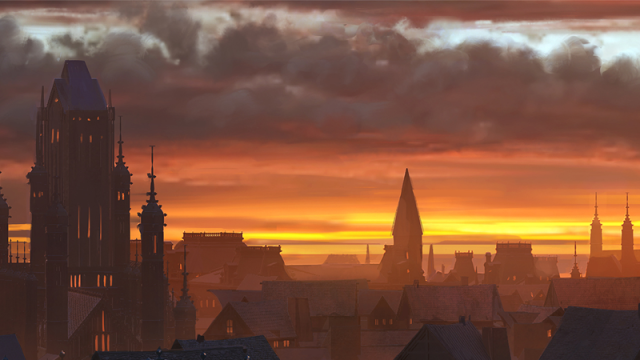Having a hand in making some of the most famous tabletop roleplaying games around is one thing, but striking out to create your own world and rules is entirely different. That’s what Rodney Thompson, a former Wizards of the Coast designer on D&D and the Star Wars RPG, did to create the world of Dusk City Outlaws.
Before taking to Kickstarter to bring his own tabletop creation to life, Thompson had an intriguing career — after years of working freelance in the tabletop industry, Thompson joined Wizards of the Coast to work on the company’s rebooted take on the Star Wars roleplaying game, before eventually becoming part of the Dungeons & Dragons team after Wizards of the Coast lost the Star Wars licence, and playing a core role in the venerable franchise’s fifth edition. After that, he left Wizards behind for an alternate path in game design: helping Bungie studios bring the world of its sci-fi RPG shooter video game Destiny to life over the past year and a half.
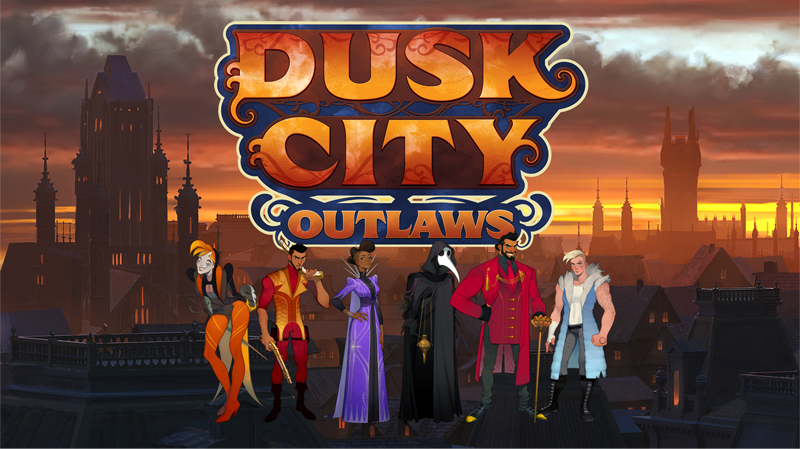
If that wasn’t enough, in his free time Thompson turned to creating his own world for a tabletop game setting. Dusk City Outlaws is a fantasy game set in a sprawling metropolis that casts players as the (attempted) masterminds of pulling off the biggest heists they can. After all, a life filled with coin is a lot easier than a life dungeoneering and fighting nasty monsters, right? We caught up with Thompson to discuss Dusk City Outlaws, his career, and the difference between designing games for tabletop and video game consoles.
io9: Tell us a little bit about the premise for Dusk City Outlaws, and what a session of playing the game might involve.
Rodney Thompson : In Dusk City Outlaws, players take on the role of criminals drawn from eight cartels that rule over the underworld of a massive fantasy city. The players come together to form a crew, [take a] Job from a broker, and then come up with their own plan, do the legwork to set it up, and then execute it. The game is meant to be pulled off the shelf and played without advanced prep time, comes as a boxed set, and includes everything that an entire gaming group needs to play. The players are in control of a lot of the narrative, helping to set up scenes, and there’s no right or wrong answer for how to pull off each Job; it’s totally in the hands of the players to decide how they want to approach things.
So, a typical session might look like this: The players all sit down at the table and pull the boxed set off of the shelf. The players grab the cartel, specialty, and character sheets, and start making characters by picking one cartel sheet and one specialty sheet, and then coming up with a name and concept for their characters. The Judge uses this time to read over one of the scenarios, which contains the basic information about the Job. Once everyone’s ready to go, the players introduce their characters via a montage showing what their characters are doing when the broker’s agents come to get them. They meet with the broker, get the basics of the Job, and then set about coming up with their plan. Over the course of several day and night segments, the players go out into the city to gather resources, take out obstacles to their success, and otherwise prep to pull off the plan. During the session’s final scene, the players put their plan into motion (be it a heist, an elaborate con, or something else), and then the Judge runs the opposition and introduces new complications and obstacles. The players need to improvise, or utilise any contingency plans they have made, to overcome these complications and succeed on the Job.
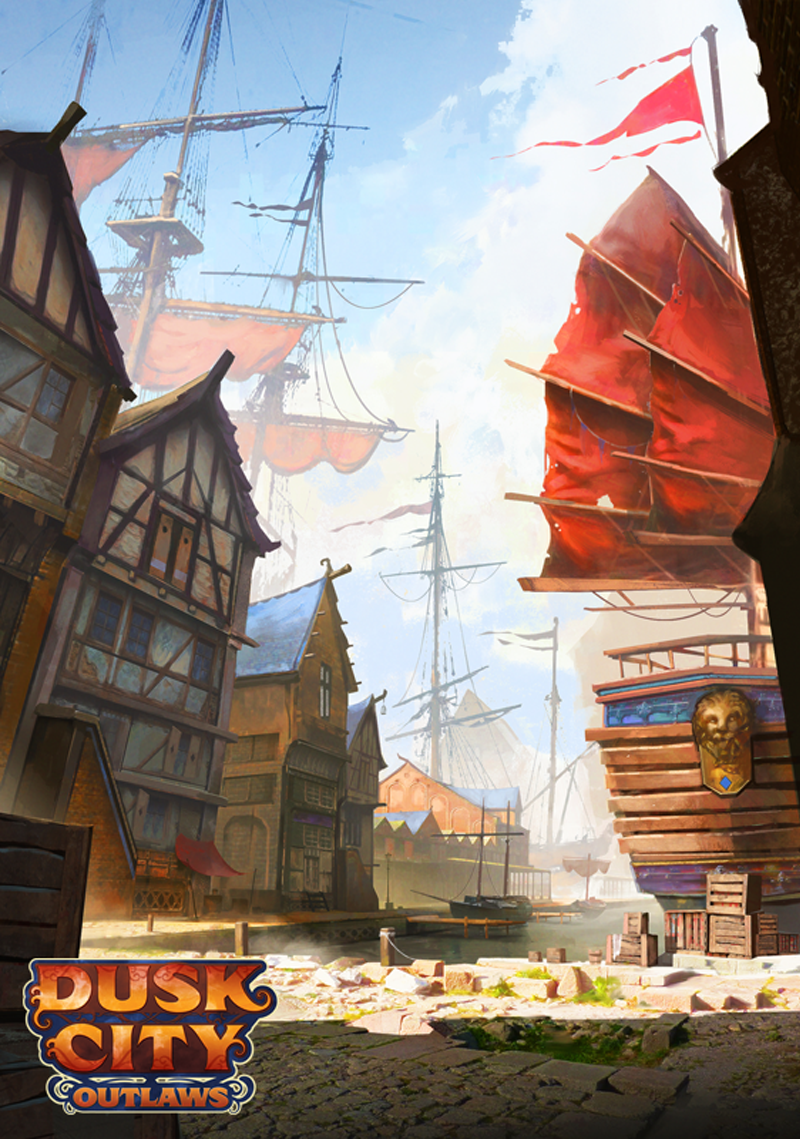
Although you’ve got a long history working in tabletop game design, DCO is your first real chance to make something that is your own world and design. What’s that process been like, transitioning from working on huge properties like D&D or Star Wars at Wizards of the Coast? What’s been the biggest challenge?
The biggest challenge has been everything outside of the game design. Wrangling artists, making sure the right files get to editors and graphic designers on time, and so forth. It was also challenging at first getting the word out about the game, but eventually I realised that one of the best ways to do that is to let people see the game being played. The livestreams have been absolutely invaluable for letting people see that the game is real, playable, and fun, and I think — were I to do another Kickstarter — I’d plan out a more extensive livestreaming schedule, especially for streams where someone other than me runs the game.
What’s the biggest thing you learned during your time at Wizards that has helped in the process of developing DCO?
Simplify, simplify, simplify. The game is already pretty rules-lean, but over the course of the design process I’ve probably done more removing of mechanics than adding. Also, I would say that something I learned while working on D&D 5th Edition in particular is to try and create fewer, but more impactful, character abilities. Instead of dealing with a lot of small bonuses, focus on big abilities that do something whenever possible. That’s why there are generally fewer mechanics that players need to deal with, but they can have a bigger impact on the game and give the player more direct control over the narrative.
As a heist game, what do you think makes DCO stand out from games like Fiasco, The Sprawl, or even D&D itself?
Compared to any individual game, lots of things; it’s more traditional than some, more narrative-driven than others. I’d say the thing that’s consistently different about Dusk City Outlaws is that designing the game to be a boxed set from right out of the gate has allowed me to lean more heavily on the physical components of the game to make it easier and faster to get the game going. You don’t have to pass a book around; everyone is picking their own game components that sit right on the table in front of them, and there is a lot of quick reference material on them that make it so you never have to crack open the rulebook. The game comes with some custom dice, which do a lot of the work carrying the dramatic twists and turns that would normally built into a scenario, instead causing them to come out in the heat of the moment. Treating the game as a complete package makes it a lot easier to know exactly how players are going to use it, and allows me to push some of the things that would be written game rules off onto the components themselves.
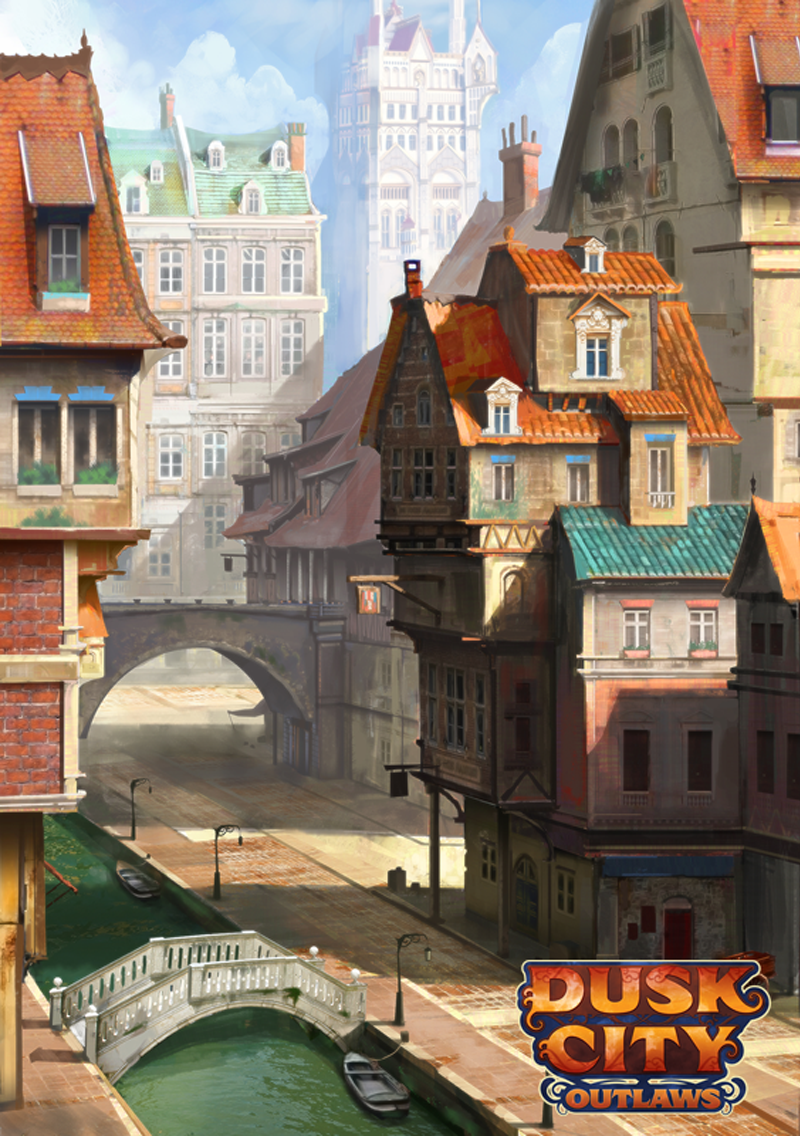
Tell us a little bit about the setting you’ve created for DCO. What inspired you?
The setting is the city of New Dunhaven, a massive fantasy city the size of modern-day New York City, but with a culture and technology level closer to Renaissance Venice. From the beginning, I knew I wanted a big, urban setting where anything can happen, sort of like the Hollywood version of New York. If you look at pop culture representations of New York, there are thousands upon thousands of different stories that work well in the setting, without ever feeling like you’re seeing the same thing twice. I wanted that same feeling, but for a fantasy city. With regards to pop culture influences, the setting draws inspiration from a lot of different sources. Scott Lynch’s The Lies of Locke Lamora is one of the biggest influences, but also the TV show Leverage. The cartels that the players belong to were spiritually inspired by the clans from Legend of the Five Rings, and more directly inspired by iconic pop culture criminal groups. I have also chosen to take a bit of a different approach with sorcery in the setting, especially coming from my D&D background. In Dusk City Outlaws, sorcery is rare, unpredictable, and costly, and there’s no overarching magic system that governs what is possible; each instance of sorcery is unique. Instead, alchemy provides a lot of the easily-accessible wonders, serving as the sort of technology in the setting. It’s much more common, much more predictable, and definitely more legal. I think it gives the setting a nice inversion of the traditional fantasy RPG use of magic and alchemy.
Would you describe DCO as more storytelling driven or mechanically driven?
I would say it’s more narratively driven, but more than that I’d say it’s more player-driven. The players are responsible for setting the scene a lot of the time, and take on some of the responsibility of worldbuilding when the Judge calls for it. They might name or describe places and NPCs, letting them share in the creation of the ongoing story in a more active way. Additionally, all characters have access to some game mechanics that let them directly impact the narrative. For example, there’s one specialty, the Mole, that is sort of the “master of disguise” infiltrator and spy. If the Mole isn’t taking part in a scene, at any time that player can pick a background character, someone inconsequential, and say, “That guy? That guy is actually me in disguise,” and then jump into the scene. There are a fair number of mechanics like that, which let the players bend the rules of traditional, chronological narratives to make something cool happen. They can’t do it all the time, though, so when it pops up, it’s impactful.
What makes the framework of a heist so perfect for tabletop gaming?
I think it’s the clear goal, the clear call to action. The players are never left asking the question, “What are we trying to do, here?” They always have an end goal in sight: steal the diamond, rob the bank, kidnap the noble, and so on. That’s super valuable, especially in sandbox-y games, because it can narrow the players’ focus and keep them from being paralysed by the infinite possibilities of what they could be doing. They still have the freedom to approach the task however they like, but they’re always moving toward a shared end goal. I think that’s something that heist and con movies have in common, and it’s why the fun part isn’t necessarily the “what” of the story, but the “how.”
What’s the weirdest or funniest scenario you’ve seen players come across while playtesting DCO?
Thompson: In one of my earlier playtests, I had a player who kicked the hornet’s nest. They got back to their hideout to discover that a Spider, one of the city’s secret police, was waiting on them. The Spider wanted the crew to work for her, instead of completing their Job, and the crew was (rightfully) nervous about having to deal with the powerful, shadowy woman. They decided they needed to discuss the matter among themselves, and the Spider graciously allowed them to step into the next room… except the crew’s gunslinger decided not to follow his companions, and instead waited until it was just him and the Spider in the room before drawing his flintlocks and trying to gun her down. Of course, Spiders are no easy prey, and she managed to leap out the window and call for the City Watch, who came pounding down the street right toward the crew’s safe house. While half the crew was yelling at the gunslinger for shooting (and missing), the crew’s alchemist ran over and decided that she was going to take out the Spider in the street below by throwing her alchemist’s fire down on the woman. One botched roll later and the entire street and several adjacent buildings caught fire. The crew scattered, kicking off a chase scene as they tried to outrun the pursuing City Watch while half a district burned. It was one of those “this just went from bad to worse to a whole lot worse” moments.
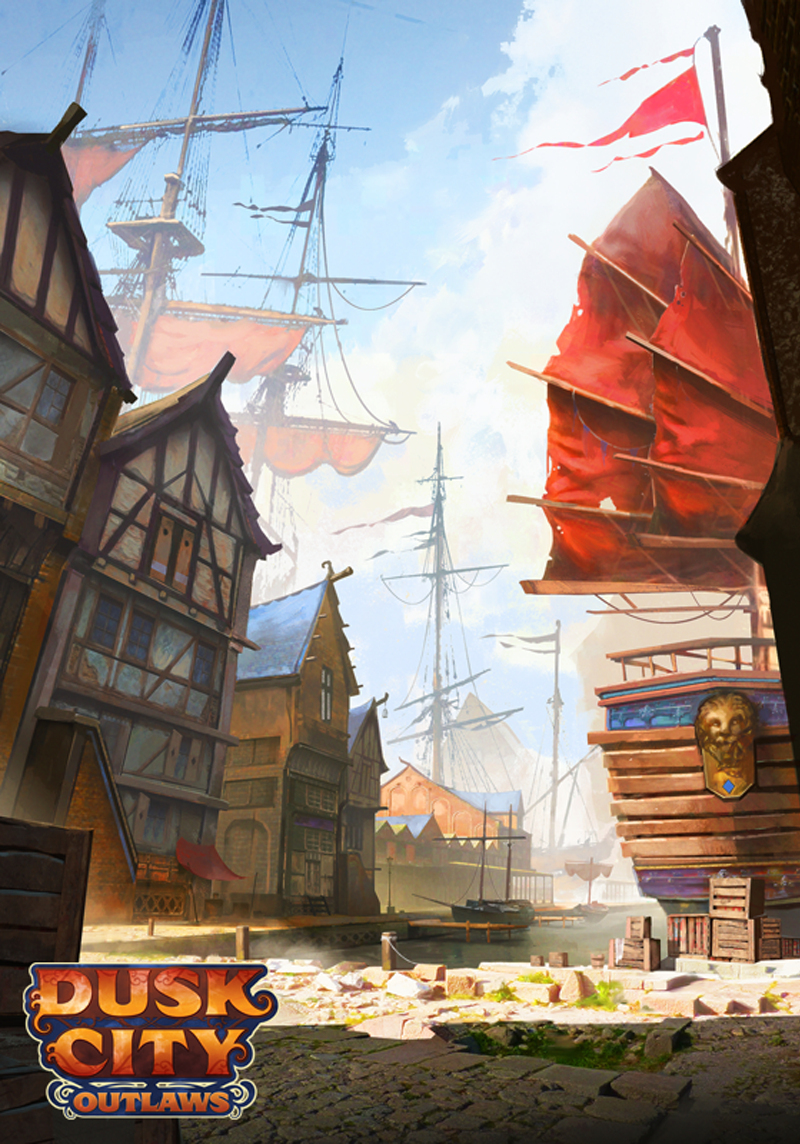
You’ve transitioned from working on tabletop games to video gaming with your work at Bungie. What crossover have you found between designing for video games and physical tabletop and board games?
Fundamentally, when you’re designing any kind of game, you’re designing an experience. When someone plays a game, they’re going to feel tension, challenge, frustration, anxiety, triumph, cleverness… the list goes on. The biggest difference between tabletop games and video games is the speed at which these things happen, and of course the method of interface. Yet it all comes back down to the fact that, when I’m creating something, I’m asking myself, “How is this going to make someone feel? Am I providing the player with enough opportunities to feel clever? Am I giving the player enough breaks in the action so they can come down from high-intensity moments? Is there a sufficient threat of failure here?” Those questions transcend mediums, though the answers I would give, and the ways I’d go about improving them if I didn’t like the answer, are drastically different.
What do you think modern tabletop gaming design can learn from video games, and vice versa?
This is easily the trickiest question in this interview, and it’s tough to answer because they already inform each other so much. Something that I think is common in the realm of video game design that I’d like to see more of in tabletop gaming is embracing new technologies. I want more apps that go along with my games, and of higher quality. I know that’s tough given the number of potential consumers being so drastically different, but I would love to see some more excitement from designers and the community alike at the prospect of integrating new technologies at the game table. We’ve seen some great overtures in this direction (the X-COM board game is at the top of my favourites list right now) and I’d like to see players embrace that more.
As for the other direction, I think it’s easy to underestimate how much influence tabletop games already have on video games; just about every video game designer I know either has or currently plays tabletop RPGs and board games. That said, one thing I think that tabletop games do well is they embrace the social aspect of gaming really thoroughly. There’s a default assumption in most tabletop games that you’re going to have a bunch of people around the table with you, and that’s built into the core design. I think the more video games can create the same kinds of social connections between people, the better. It’s one of the reasons why I love working on Destiny so much, because the members of the community form such strong bonds while playing the game.
If you want to know more about Dusk City Outlaws, you can check out the Kickstarter — and even though the game is fully funded, you can still contribute to get your own copy and get in on backer rewards before the campaign ends February 28.
